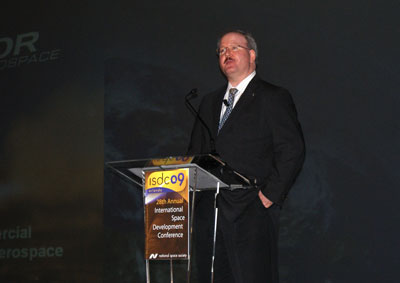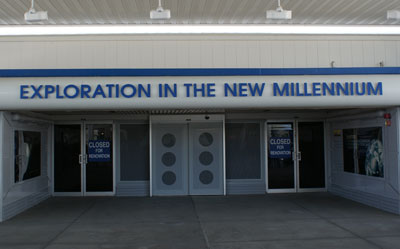Waiting for Augustineby Jeff Foust
|
| Augustine said he wants no “zealots” on his panel. “By zealot I mean somebody who’s made up their mind and is just interested in selling their position, because that’s not our role,” he explained. “Our role is to listen and weigh.” |
While there’s no formal announcement of who will be on the panel, the Orlando Sentinel published last Thursday a list of seven people likely to be on it. (The Sentinel added an eighth, former astronaut Leroy Chiao, the next day.) Many of the names are not surprising: Lester Lyles, for example, served on the President’s Commission on Implementation of United States Space Exploration Policy, better known as the Aldridge Commission after its chairman, five years ago; Sally Ride has served on a number of panels over the years, including the investigations into the Challenger and Columbia accidents. Others have long backgrounds in industry or academia.
One name that stood out, though, was Jeff Greason, the president of XCOR Aerospace. He is best known, beyond his work running his small but growing NewSpace company, as a leading advocate for the emerging personal spaceflight industry, including the development of a regulatory environment that won’t stifle the industry. Perhaps his closest link to a panel like this was as a witness at one of the public hearings held by the Aldridge Commission.
That choice, if indeed true, makes Greason’s speech last Thursday at the National Space Society’s International Space Development Conference (ISDC) in Orlando all the more interesting. Greason was one of the plenary speakers that morning—a few hours before the Sentinel published its list—on a commercial track that also included FAA associate administrator for commercial space transportation George Nield and Virgin Galactic president Will Whitehorn. And while his speech was primarily focused on XCOR’s development work, he did take some time to talk about the relevance of civil space and its relationship with the commercial sector.
“There’s been a lot of discussion over the years about what NASA is doing and what NASA should so, but there’s a question that gets asked far too seldom, which is why do we have NASA?” he said, noting that his comments were solely his own opinions. “Why do we have a civil space program at all? What’s it for? Any discussion about what NASA should do or how it should do it—which is the thing we all do talk about a lot—presupposes an agreement on why we are doing it at all that I don’t think exists.”
The closest thing NASA has to a real mission statement, he said, is a list of objectives contained in the National Aeronautics and Space Act, the legislation that created NASA in 1958. He singled out in particular the first five on that list in the act:
(1) The expansion of human knowledge of the Earth and of phenomena in the atmosphere and space;
(2) The improvement of the usefulness, performance, speed, safety, and efficiency of aeronautical and space vehicles;
(3) The development and operation of vehicles capable of carrying instruments, equipment, supplies, and living organisms through space;
(4) The establishment of long-range studies of the potential benefits to be gained from, the opportunities for, and the problems involved in the utilization of aeronautical and space activities for peaceful and scientific purposes;
(5) The preservation of the role of the United States as a leader in aeronautical and space science and technology and in the application thereof to the conduct of peaceful activities within and outside the atmosphere;
While the origins of NASA date back to the Cold War-fueled space race between the US and the Soviet Union, Greason said these statements do “wrap around a key set of central objectives for NASA that makes sense” even today.
| “There is an infinitely large number of ways that you can go about exploring,” said Greason, “but there is not an infinitely large subset of those ways which not only result in exploration, but would also result in a path left behind… and things being done in a way that the nation and the world can make use of what we have found.” |
Something lost in the debate of what NASA should be doing, he explained, is why and how it can better benefit the nation as a whole. Arguments between whether the government or private sector is better suited to perform particular tasks “totally misses the point that they are two halves of a common goal,” he said. That is, he said, because the exploration part of NASA’s mission helps the country prosper (as exploration has helped other civilizations prosper in the past), but only if people can do something with the knowledge gained from such exploration.
“That is the one thing we have lost sight of in our civil space program, and that’s the why we do what we do,” he said. “There is an infinitely large number of ways that you can go about exploring, but there is not an infinitely large subset of those ways which not only result in exploration, but would also result in a path left behind… and things being done in a way that the nation and the world can make use of what we have found.”
 Jeff Greason of XCOR Aerospace talks about the relationship between civil and commercial space programs at the ISDC on May 28. (credit: J. Foust) |
Other reactions, from A to Z
Other speakers at the ISDC addressed the Augustine panel and its task head-on. Geoffrey Yoder, director of the Constellation Systems Division at NASA, called Augustine “an excellent choice” to lead the panel during a session Friday. He added that NASA was pressing ahead with the current architecture while the panel performed his work, and wouldn’t speculate on the outcome. “Potential outcomes? You really have to leave that to what the team comes up with,” he said.
Whatever the panel concludes, Yoder said, it was important for everyone involved to support how the administration decided to implement the panel’s recommendations. “I think that it’s extremely important that we unite and go forward.”
In a speech Saturday at the ISDC, Mars Society president Rober Zubrin expressed his concerns about the future of NASA’s exploration plans. “I believe that the Vision for Space Exploration, or whatever it is currently called, is in great danger,” he said. “This program is currently conceived as something that the Bush people invented, and therefore from the point of view of the Obama people is completely suspect if not axiomatically wrong.”
Zubrin warned that NASA funding could be jeopardized if the administration decides to cut spending to lower budget deficits once the economy recovers. “While Obama has not been an opponent of the space program, it has never figured in a significant way in his portfolio of interests,” making it especially vulnerable to budget cuts.
The way around that, he said, is to give NASA “a truly bold and visionary” mission—humans to Mars, unsurprisingly, in Zubrin’s view. “The idea that NASA’s great vision should be to return to the Moon 50 years after it was there the first time is not going to inspire the American public, and it hasn’t.”
In an interview after his speech, Zubrin said that he expected the Augustine panel to look at broader goals for human spaceflight rather than tackle a detailed technical analysis of Constellation and competing architectures, given the names associated with the panel to date. “Either they say going to the Moon is stupid and we should keep going up and down to the space station, or going to the Moon is stupid and we should set ourselves a real goal, and that is to aim for Mars,” he said. There’s some reason to hope for the latter, he said, noting that panelist Chris Chyba is an exobiologist who might better appreciate the scientific rationale for human Mars exploration.
| “Having been there and stood on its surface, I can tell you that the Moon is a dead end for NASA,” Aldrin said. “We won’t honor Apollo 11 by repeating its mission.” |
Later in the day Apollo 11 astronaut Buzz Aldrin expressed similar sentiments about what the ultimate goal of NASA’s exploration plans should be. The panel, he believed, would only look at the plans for the return to the Moon. “The commission probably won’t consider why this goal for the space program has failed to inspire our youngsters and what to do to galvanize public support for a reinvigorated space program.”
The solution, Aldrin said, was to avoid going “back to the future” and potentially getting entangled in another race to the Moon. “Having been there and stood on its surface, I can tell you that the Moon is a dead end for NASA,” he said. “We won’t honor Apollo 11 by repeating its mission.”
Like Zubrin, Aldrin believed that NASA should focus on human exploration of Mars, advocating for a first human mission by the 60th anniversary of Apollo 11. “Mars, for America’s future, is where we should be headed,” he said. “That’s the best way to commemorate Apollo 11.”
There will be opportunities for Aldrin, Zubrin, and others to communicate those views to the panel in the coming weeks: a public meeting has already been scheduled for June 17 in Washington, and Augustine previously said the panel would likely establish a web site to solicit public input. Less certain, though, is just what impact the panel will have on shaping the future of NASA’s human spaceflight programs: history is littered with reports by special commissions with recommendations that were ignored or otherwise failed to be adopted. Some are skeptical that this panel will be any different.
Nonetheless, there is an opportunity to at least attempt to reshape the goals and priorities of human spaceflight. In his Thursday speech, Greason said that given the limited budgets available for NASA, the nation should focus on space exploration in such a way that “views it as an integrated whole”, so that it fulfills all the goals mentioned in its enabling legislation. That includes item number 4, studying the potential benefits of these activities, something that he said he rarely hears discussed. “That’s a clarion call that we’ve missed for why we do what we do, and why we should do things differently going forward.”
